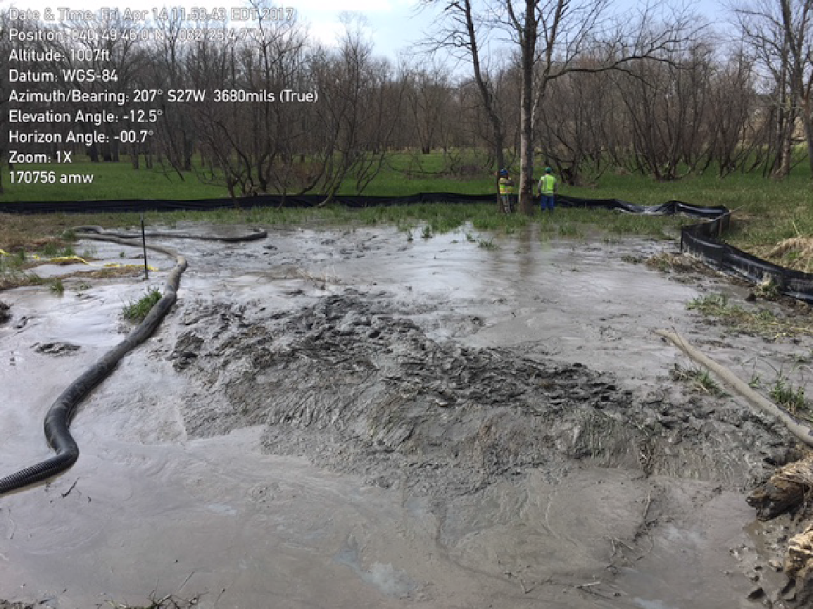Columbus, OH -- During the first 8 weeks of the project, Energy Transfer Partners Rover Pipeline construction crews racked up 27 violations of the Clean Water Act and the Clean Air Act. The worst spill, occurring on April 13, 2017, buried one of Ohio’s finest wetlands with drilling fluid when crews were attempting to drill underneath the Tuscarawas River in Stark County. The resulting spill of more than 2 million gallons of drilling fluid buried an area the size of eight and a half football fields with a thick slurry, smothering all plant and animal life. The Ohio Environmental Protection Agency has stated that it may take decades for the wetland to recover, if ever.[1]
The entire Rover project will destroy 343 acres of upland forest. Along the route, ETP Rover will tunnel under 18 Ohio rivers and streams including the Maumee, Portage, Sandusky, and Mohican rivers and under the Ohio River at three separate locations. It will cut through areas where eight communities draw drinking water from community wells linked to groundwater aquifers and pass within three miles of river channel drinking water intakes for six communities. Rover Pipeline threatens water resources in 18 Ohio counties and will also destroy areas of Wayne National Forest.
Check out our Pipeline and Dirty Fuels page to find out more.
[1] Ohio officials: it will take decades for wetlands to recover after major pipeline fluid spill, https://thinkprogress.org/ohio-fines-company-behind-dakota-access-430-000-for-wetlands-destruction-59f4c4b6b819
5/9/17 Columbus, OH -- Over the weekend, Sierra Club discovered that Energy Transfer’s fracked gas pipeline, Rover, has spilled six times in a two-week period, has had six stormwater violations, and violated the Clean Air Act all before the pipeline even goes into operation.
The Rover pipeline will carry fracked gas across four states, including 18 Ohio counties. It will cross three major rivers that feed into Lake Erie: the Maumee, Sandusky, and Portage. Its route would also put Tuscarawas River, Wayne National Forest, other waterways, and countless miles of forest and farmlands at risk for contamination and disruption.
“Energy Transfer is either incompetent or simply doesn’t care about Ohioans’ safety,” said Jen Miller, Director of Sierra Club Ohio. “The recklessness constructing Rover Pipeline has put our clean water, air, and land in immediate danger with its spills and violations, and it must be stopped. Ohio EPA needs to keep our communities safe by forcing a halt to the pipeline’s construction until the company completely reorganizes its construction program and fully remedies the harm it has already caused to communities and landowners thus far.”
Energy Transfer failed to inform the public its numerous spills and violations. Rather, the news was discovered after Sierra Club’s attorney, Richard Sahli, filed a records request with the Ohio Environmental Protection Agency.
“Energy Transfer has caused more widespread environmental damage throughout Ohio than any other company in history,” said attorney Richard Sahli. “This pattern of reckless destruction calls for the strongest penalties provided in Ohio law, including a criminal investigation of the responsible individuals within the corporation and its subcontractors.”
Documents obtained during the record request indicate that in addition to over 14 violations, the company anticipates additional spills throughout the duration of the project, which is estimated to last six months. The records request also uncovered a recent Ohio EPA letter to Rover Pipeline in which the Agency demanded a fine of $431,000 for its violations to date.
“If Energy Transfer is already destroying our air, water, and land, how can we trust them to build a pipeline that actually functions properly,” asks Miller. "Energy Transfer has proven to not be trustworthy.”
In addition to the Rover pipeline, Energy Transfer is the company behind the controversial Dakota Access Pipeline.

Energy Transfer’s currently known environmental violations include:
April 5, 2017: unauthorized pollution release impacting tributaries of Woodfield Reservoir in Monroe County, failure to control stormwater
April 8, 2017: 1,000 gallons of drilling fluid pollution released into wetland near Indian Fork River, in Tuscarawas County; covered 2500 square foot area of wetland
April 10, 2017: 600 gallons of drilling fluid pollution released into stream, wetland and pond in Richland Township, Belmont County
April 10, 2017: unauthorized pollution release impacting tributaries of Woodfield Reservoir in Monroe County, failure to control stormwater
April 11, 2017: unauthorized pollution release from failure to manage stormwater in Bloomdale, Wood County
April 11, 2017: Clean Air Act violation, open burning of site preparation material near a home in Toronto, Ohio
April 11, 2017: Stormwater violations in Wood, Richland, and Crawford Counties because of failure to manage vehicle tracking of drilling materials onto public roadways
April 12, 2017: unauthorized pollution release into Bull Creek in Wood County, failure to control stormwater
April 13,2017:2 million gallons of drilling fluid pollution accumulating in high quality wetland adjacent to Tuscarawas River in Navarre Township, Stark County; covered 500,000 sq foot area of the category 3 wetland
April 14, 2017: 50,000 gallons of drilling fluid pollution released into wetland in Mifflin Township, Richland County
April 17, 2017: 200 gallons of drilling fluid pollution released into a pond in Monroe Township, Harrison County
April 22, 2017: 200 gallons of drilling fluid pollution released into stream in Wooster Township, Wayne County
May 2, 2017: unauthorized pollution release from failure to manage stormwater in Bloomdale, Wood County
May 3, 2017: unauthorized pollution release into Brushy Fork Creek, Cadiz, Harrison County, failure to control stormwater